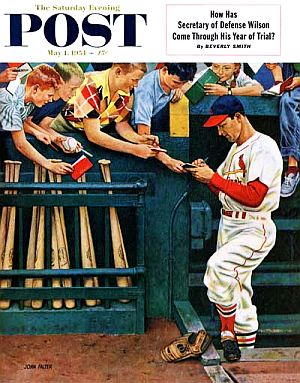Presidents and presidential candidates often seek out popular film stars, notable musicians, sports figures and other celebrities to help them advance their policies and/or win their election campaigns. Such was the case with Jack Kennedy in his 1960 bid for the Whites House. Kennedy, of course, had the benefit of a wealthy father who was well connected in Hollywood and elsewhere. And JFK, on his own count, had high-powered support from notable friends like Frank Sinatra and his infamous “Rat Pack.” But Kennedy also sought out VIPs from other fields – one of whom was the famous St. Louis Cardinals’ baseball star, Stan Musial.

After he became president, JFK and St. Louis slugger Stan Musial, visit briefly before the July 1962 All-Star Game in Washington, where Kennedy threw out the ceremonial game ball. Baseball Commissioner Ford Frick is at center. Musial in the All Star game would have a base hit that led to a run. That year he would compile a .330 average.
In September 1959, Kennedy was campaigning in Milwaukee, Wisconsin during the early days of his run for the White House. The Wisconsin Democratic primary – an important stepping stone to the nomination – was still months away, and the Democratic National Convention would not convene in Los Angeles until the summer of 1960. Still, Kennedy had already been working hard for the nomination, and was always looking for ways to improve his chances. That day in Milwaukee, Kennedy spotted Stan Musial standing in front of a hotel waiting for the team bus to take him to a game later that day with the Milwaukee Braves.
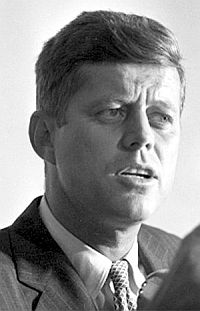
U.S. Senator John F. Kennedy, 1959.
Stan Musial was then in the later years of his baseball career, but showing no signs of failing ability. Having grown up and played his high school ball in Donora, Pennsylvania, Stan Musial — named Stanislaw Franciszek at birth by his immigrant Polish father — began his major league career with the St. Louis Cardinals in 1941. And with the exception of two seasons for WW II military service, he continued with the Cardinals for 22 seasons, retiring in 1963. Musial is widely regarded as being one of the greatest and most consistent hitters in baseball history. He would win the National League batting title seven times, was named the National League’s Most Valuable Player three times, and led his team to three World Series championships. Musial also shares – with Hank Aaron and Willie Mays – the major league record for the most All-Star Games played at 24. So when Jack Kennedy met him in 1959, “Stan The Man” as he was nicknamed, was already a baseball immortal, destined for the Hall of Fame and more.
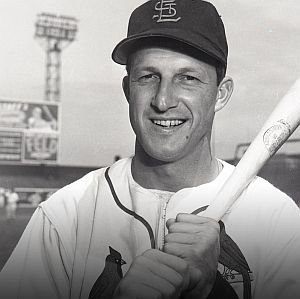
Baseball star, Stan Musial of the St. Louis Cardinals.
On the campaign trail in October 1960, Musial joined a group of other notables who worked for Kennedy in nine Midwest and Western states; tough conservative states where Kennedy needed help. Joining Musial on the campaign trail in that fall tour were other VIPs: author James A. Michener; future Supreme Court judge Byron (Whizzer) White; historian Arthur M. Schlesinger, Jr.; actress Angie Dickinson; actor Jeff Chandler, and JFK in-laws – Ethel Kennedy, wife of brother Robert Kennedy; and Joan Kennedy, wife of brother Ted Kennedy.
During what Michener would describe “as grueling a tour as could have been devised,” Musial was a leading attraction. “I was constantly astonished at how the men in the cities we stopped at would crowd the airports to see Stan Musial,” Michener would later write. “He seemed about 15 years younger than he was, and men who were [then] quite old remembered him as a beginner in the big leagues.” Angie Dickinson would echo Michener’s observations about the rigors of the tour, where some in the crowds “booed us and threw things at us.” But of Musial, Dickinson recalled him as being upbeat and full of good humor. And he apparently did quite well with some of the crowds, telling baseball tales and even getting Republicans to cheer him.
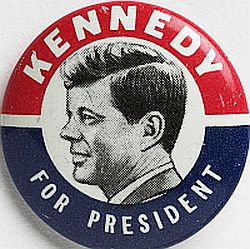
“Kennedy-for-President” campaign button.
At election’s end, Musial would often joke that his campaigning “lost all nine states for the President,” or that he cost Kennedy votes in those states. Yet in reality, he may have actually helped provide JFK at least some of the margin he needed to win the two key states of Illinois and Michigan. But the Kennedy-Johnson ticket did lose seven of the nine states that Musial and the VIPs had stumped in – Colorado, Idaho, Indiana, Kentucky, Oklahoma, Nebraska, and Utah. Still, Kennedy won the election overall, with a razor-thin victory over Republican Richard Nixon (more detail on the 1960 election campaign can be found at “JFK’s 1960 Campaign.”)
1962
All Star Game
Musial and JFK met again at the 1962 All-Star game in Washington, D.C., where Kennedy would throw out the game ball. At that time, JFK was 45 and Musial was 41. He was appearing in his 22nd All-Star Game. Before the game, JFK summoned Musial to come over and visit him in the box seat section of the ball park where he and his party were gathered. There, Musial reprised the line Kennedy had used with him back in 1959: “They say you’re too young to be president and I’m too old to be playing baseball, but here we are,” said Musial, suggesting they had indeed surprised their respective critics – JFK was a young, successful president and Stan Musial was an old successful All Star!
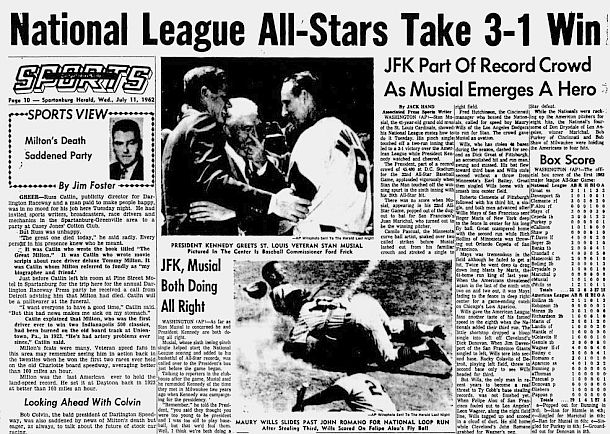
July 11th, 1962 sports page headlines from the Spartanburg, South Carolina “Herald-Journal” newspaper on the outcome of the Major League Baseball All-Star game played in Washington, D.C., where President John F. Kennedy and St Louis Cardinal stand out, Stan Musial, became part of the story.
In the game, Musial delivered a line-drive single to right field as a pinch-hitter in the sixth inning. Maury Wills came in as a pinch runner for Musial, then stole second base. Wills then scored from second after Dick Groat hit a single. The National League All-Stars won, 3-1. But in some of the newspaper coverage the next day, both Kennedy and Musial garnered a share of the headlines. “JFK Part of Record Crowd As Musial Emerges A Hero,” read one, while another, picking up on Musial’s comments, noted: “JFK, Musial Both Doing All Right.”
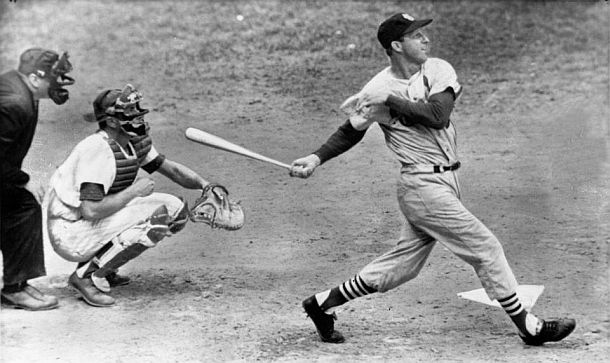
St. Louis Cardinal baseball great, Stan Musial, connecting with one in the prime of his career.
On July 12th, 1962, following the All Star game, Musial and his family – wife Lillian and daughter Janet – were given a VIP tour of the White House, also meeting with President Kennedy. Musial and JFK traded some baseball talk that day, as Kennedy asked Musial about his home run total and whether he might surpass Ty Cobb for the all-time hits record. (Ty Cobb held the record then with 4,191 hits. Musial was closing in on him, but would not surpass him, ending his career in 1963 with 3,630 hits, which is still 4th highest all time. Pete Rose now holds the top spot at 4,256 hits. Musial would finish his career with 475 home runs, at the time, No. 2 in the National League, behind Mel Ott with 511. Today, Musial is ranked at No. 30 among all-time home run leaders).
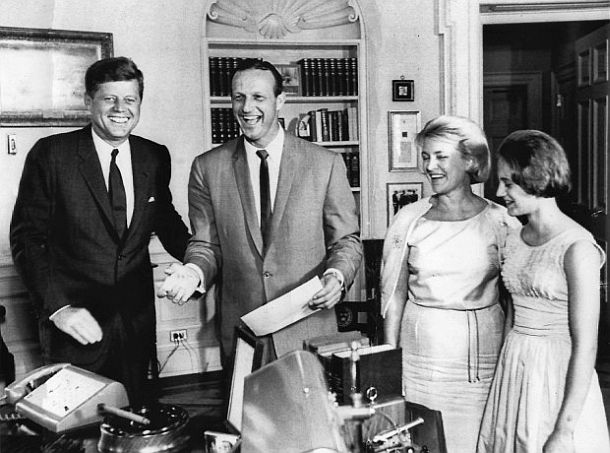
July 12th, 1962: President Kennedy greets St. Louis Cardinal baseball slugger, San Musial and family – wife Lillian and daughter Janet – in the Oval Office during their VIP visit at the White House following the All-Star game.
At the White House, Musial, wife and daughter, and JFK posed for some photos, and the president presented Musial with a PT 109 tie pin (PT 109 was the famous Navy patrol boat under Kennedy’s command in WWII) and also an autographed picture. During the visit, Musial was congratulated by White House staffers for his single in the All-Star Game, but he noted, “I got a bigger kick out of the handshake with the President before the game.” Musial also noted that the President told the people in his party what a good job of campaigning Musial had done for him.
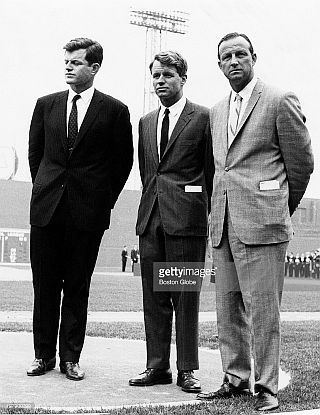 17 April 1964: Ted Kennedy, Robert Kennedy and Stan Musial on the pitcher’s mound at Fenway Park ceremonies, opening day. Photo, Boston Globe. |
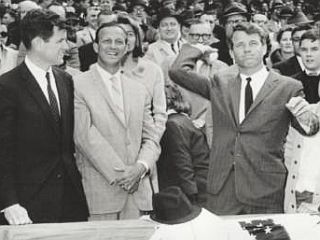 17 April 1964: Robert F. Kennedy throws out the game ball at baseball’s opening day at Fenway Park with Ted Kennedy, Stan Musial and others looking on. |
Stan Musial would compile an outstanding .330 batting average in 1962. President Kennedy, meanwhile, had his hands full will all manner of tough decisions that only presidents deal with. Yet Kennedy would apparently place telephone calls to Musial on occasion. According to reports from Musial’s grandson, Brian Schwarze, a long-time secretary of Musial’s named Patty Anthony, “almost fell out of her desk a couple of times” when Kennedy called looking to talk with Musial. And on that bleak day in November 1963 when JFK was assassinated in Dallas, Texas, Stan Musial pulled his daughters out of school and they spent the rest of the day praying at the Cathedral Basilica in the Central West End area of St. Louis.
Five months after the JFK tragedy, Stan Musial would appear on the baseball diamond at Boston’s Fenway Park with JFK’s brothers, Bobby and Ted in pre-game ceremonies on opening day, April 17th, 1964. It was the first baseball season following the president’s death. Also attending that day were JFK sisters, Jean Smith and Patricia Lawford and other VIPs. Robert Kennedy, who was then U.S. Attorney General, threw out the game ball that day in his brother’s memory. Stan Musial was officially representing President Lyndon Johnson and the President’s Council on Physical Fitness. Proceeds from the game went to the JFK Library Fund to honor the fallen president. And on that day as well, newly-minted JFK half dollars were given out to the first 6,000 ticket buyers.
Stan Musial would serve on the President’s Council on Physical Fitness and Sports from 1964 to 1967. In 2011 he was honored by President Barack Obama with the Presidential Medal of Freedom, who called him “an icon untarnished, a beloved pillar of the community, a gentleman you’d want your kids to emulate.” Stan Musial died in January 2013 of natural causes; he was 92 years old. An inscription on his statue outside of Busch Stadium in St. Louis portraying him in his fabled batting stance states: “Here stands baseball’s perfect warrior. Here stands baseball’s perfect knight.” Musial had a stellar reputation on and off the field, regarded as a model human being and sports icon.
Additional stories at this website on baseball can be found at the “Baseball Stories” topics page, and on the Kennedys, at the “Kennedy History” topics page. For politics-related history, see the “Politics & Culture” page. Thanks for visiting – and if you like what you find here, please make a donation to help support the research and writing at this website. Thank you – Jack Doyle
|
Please Support Thank You |
____________________________________
Date Posted: 25 March 2016
Last Update: 25 March 2016
Comments to: jackdoyle47@gmail.com
Article Citation:
Jack Doyle, “Jack & Stan, Kennedy/Musial: 1959-64,”
PopHistoryDig.com, March 25, 2016.
____________________________________
Sources, Links & Additional Information
 Sept 5, 1949: Time cover illustration of Stan Musial by artist Ernest Hamlin Baker, with cover caption, “Thirty Days Hath September,”referring to the show-down pennant race at the time between the St. Louis Cardinals and the Brooklyn Dodgers, and Musial being a key player in that race. |
John F. Kennedy Presidential Library and Museum, JFKlibrary.org, Boston, MA.
Kenneth P. O’Donnell and David F. Powers with Joe McCarthy, Johnny, We Hardly Knew Ye, Boston: Little Brown & Co., 1970.
George Vecsey, Stan Musial: An American Life, ESPN, 1st Edition, May 2011, 416 pp.
“Stan Musial,” Wikipedia.org.
“Musial Shared Special Bond with JFK,” RetroSimba.com, November 19, 2010.
Michael Quinlin, “Honey Fitz & Sweet Caroline: A Century of Fenway,” Irish America.com, June / July 2012.
David Cohen, “Stan Musial on The Campaign Trail,” Politico.com, January 19, 2013.
George Vecsey, “The Star Who Stood Out by Not Standing Out,” New York Times, January 20, 2013.
Pat McGonigle, “JFK and Stan the Man,” KSDK.com (NewsChannel/St. Louis/Gannet), November 22, 2013.
Michael Beschloss, History Source, “Base- ball’s Role in J.F.K.’s Life,” New York Times, May 23, 2014.
“Statement by Senator John F. Kennedy on National Sportsmen for Kennedy Com-mittee,” October 21, 1960, The American Presidency Project.
“Anniversaries: Junior Griffey/ Stan the Man/ JFK,” GeorgeVecsey.com, November 21, 2012.
John Kelly, “Author Seeks Help in Finding 2 Boys Who Were JFK’s Guests at 1962 All-Star Game,” Washington Post, August 1, 2011.
Topics Page, “Baseball Stories, 1900s-2000s,” PopHistoryDig.com, March 22, 2012 (includes thumbnail sketches & links to 14 baseball-related stories at this website).
Jack Doyle, “JFK’s 1960 Campaign, Primaries & Fall Election,” PopHistoryDig.com, July 20, 2014 (story includes introduction, summary & listing of city-by-city campaign itinerary with extensive photos of JFK’s 1960 presidential campaign).
Topics Page, “Kennedy History – 12 Stories: 1954-2013,” PopHistoryDig.com, November 10, 2013 (includes thumbnail sketches & links to 12 Kennedy-related stories at this website).
____________________________________________________________
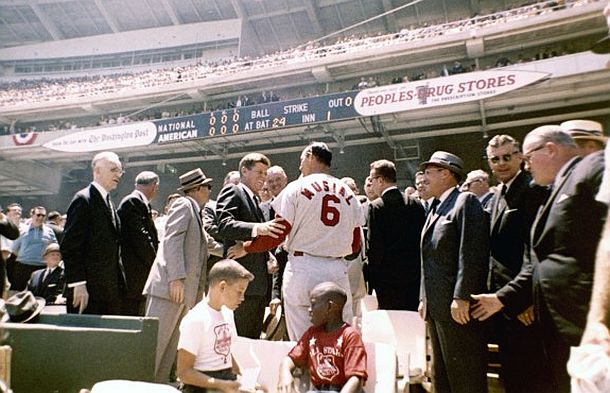
JFK and Stan Musial greeting one another at the 1962 All-Star game, played at Washington, D.C.’s new Washington Stadium. Among those in the President’s party that day were: Speaker of the House, John McCormack, Kennedy aide, Dave Powers, Vice President Lyndon Johnson, Lawrence O’Brien, Commissioner of Baseball, Ford Frick, and in the foreground, center, two young guests of the President from the Washington Boys Club. Click for framed, Musial-autographed, 16x20 commemorative photo.

July 1962: After the president’s party shed their jackets and settled in for the All-Star game seated behind a dugout, JFK and his aide, Dave Powers, rise from their seats tracking a foul ball hit in their direction.
